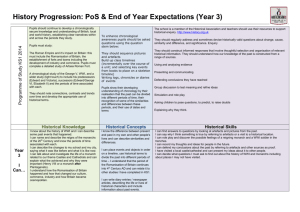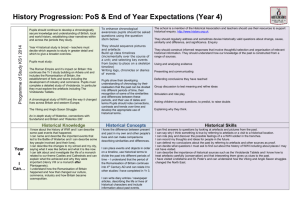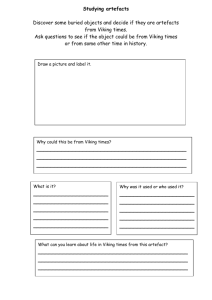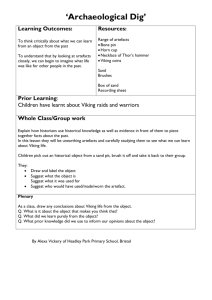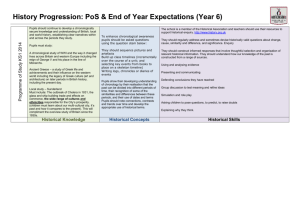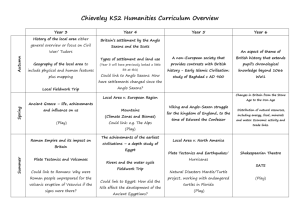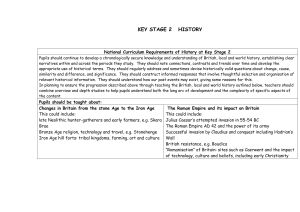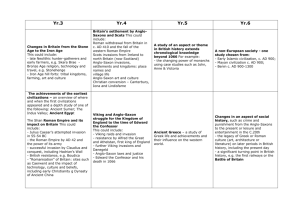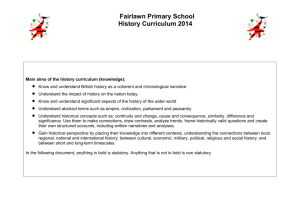Yr 5 History
advertisement
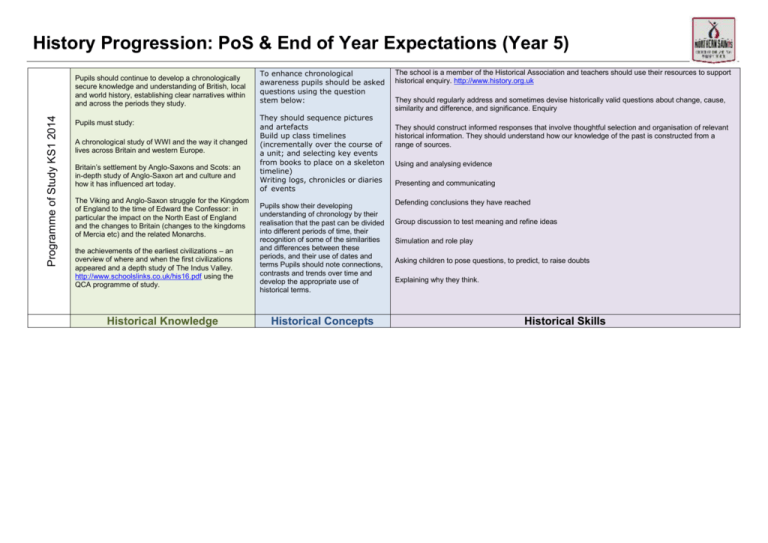
History Progression: PoS & End of Year Expectations (Year 5) Programme of Study KS1 2014 Pupils should continue to develop a chronologically secure knowledge and understanding of British, local and world history, establishing clear narratives within and across the periods they study. Pupils must study: A chronological study of WWI and the way it changed lives across Britain and western Europe. Britain’s settlement by Anglo-Saxons and Scots: an in-depth study of Anglo-Saxon art and culture and how it has influenced art today. The Viking and Anglo-Saxon struggle for the Kingdom of England to the time of Edward the Confessor: in particular the impact on the North East of England and the changes to Britain (changes to the kingdoms of Mercia etc) and the related Monarchs. the achievements of the earliest civilizations – an overview of where and when the first civilizations appeared and a depth study of The Indus Valley. http://www.schoolslinks.co.uk/his16.pdf using the QCA programme of study. Historical Knowledge To enhance chronological awareness pupils should be asked questions using the question stem below: They should sequence pictures and artefacts Build up class timelines (incrementally over the course of a unit; and selecting key events from books to place on a skeleton timeline) Writing logs, chronicles or diaries of events Pupils show their developing understanding of chronology by their realisation that the past can be divided into different periods of time, their recognition of some of the similarities and differences between these periods, and their use of dates and terms Pupils should note connections, contrasts and trends over time and develop the appropriate use of historical terms. Historical Concepts The school is a member of the Historical Association and teachers should use their resources to support historical enquiry. http://www.history.org.uk They should regularly address and sometimes devise historically valid questions about change, cause, similarity and difference, and significance. Enquiry They should construct informed responses that involve thoughtful selection and organisation of relevant historical information. They should understand how our knowledge of the past is constructed from a range of sources. Using and analysing evidence Presenting and communicating Defending conclusions they have reached Group discussion to test meaning and refine ideas Simulation and role play Asking children to pose questions, to predict, to raise doubts Explaining why they think. Historical Skills History Progression: PoS & End of Year Expectations (Year 5) Year 5 I Can… I know about the history of WWI and I can describe some past events that happened. I can name and describe the important events and historical perspectives as civilisation formed in the Indus Valley. I can describe the changes to my school and my city, saying what it was like before and what it is like now. I can talk about and investigate the lives of Anglo Saxons and Vikings can explain what they achieved and why they were important in establishing modern Britain (I understand how they brought art, culture and laws). I understand how the settlement of Britain happened from 300AD – 1066AD and how that changed our culture, commerce, industry and how Britain became cosmopolitan. I know the difference between present and past in my own and other people's lives and can make comparisons describing similarities and differences. I can place the Anglo Saxons and Viking struggle on a timeline, use historical terms to divide the past into different periods of time – I understand that the period from the 4th Century AD to 11th Century AD changed the face of Britain and we still have that legacy today. I can find answers to questions by looking at artefacts and pictures from the past. I can say why I think something is true by referring to artefacts or a visit to a historical location. I can role play and discover the possible feelings of a WWI soldier in the trenches. I can record my thoughts and ideas for people in the future. I can defend my conclusions about the past by referring to artefacts and other sources as proof. I can decide what questions I must ask to find out about the history of WWI including about places I may not have visited. I can describe the importance of historical sources such as the Lindisfarne Gospels, various AngloSaxon and Viking artefacts and I know how to treat artefacts carefully (conservation) and that interpreting them gives us clues to the past. I know that views about the past differ and I have visited a Viking / Anglo-Saxon site and museum and can understand how the Viking and Anglo Saxon struggles changed the North East. I can write diary entries / newspaper articles, describing the life or lives of historical characters and include information about past events. We use the “I can statements” in bold to assess whether the children are at the expected level by the end of Year 5. We will report to parents / carers each half-term saying whether or not your child is on track to ‘achieve’ or ‘exceed’ the expected level. The list below contains common stems that can be used to devise key questions that focus on specific areas of historical knowledge, skills and understanding: Question stem Link to key concepts and key skills Question stem Link to key concepts and key skills 'What was it like ...?' Enquiry 'What were the effects ...?' Causation 'What was it like in/for ...?' Features of societies 'Why do we remember ...?' Causation 'Why was ... So important to the ... Features of societies 'Does ...tell us the truth about Interpretations History Progression: PoS & End of Year Expectations (Year 5) people?' ...?' 'What were the differences ...?' Change 'Why do people disagree about ...?' Interpretations 'How did life change...?' Change 'Was ... a hero/ villain as portrayed?' Interpretations
